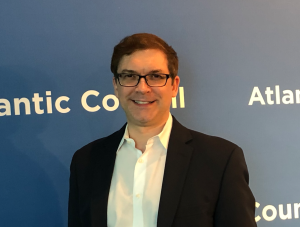Washington DC — November 29, 2022: Today, the Atlantic Council signed a Memorandum of Understanding with NATO’s Allied Command Transformation to leverage their complementary strengths to collaborate on the military transformation of the Alliance at this crossroads moment for transatlantic security and defense. The agreement also informs key transatlantic policy debates.
“Russia’s brutal war in Ukraine spotlights new, difficult challenges for the transatlantic community,” said Atlantic Council President and CEO Frederick Kempe. “To maintain its warfighting and technological leadership, as it has for the past 70 years, NATO needs to anticipate novel threats, adapt its structures and strategies to respond to them, and cooperate even more closely than before. That’s why collaborating with ACT to help elevate this long-term issue set is a natural partnership for the Atlantic Council – an organization founded to enhance intellectual leadership on NATO in Washington.”
“Whether harnessing the opportunities presented by the digital revolution, building resilience in Allied networks and societies, preparing for cognitive warfare or enabling data-centric, modular and agile multi-domain operations by 2030, NATO Allied Command Transformation’s role will only continue to grow in the future,” said NATO ACT Chief of Staff Vice Admiral Guy Robinson. “We need to think comprehensively about the future of warfare and convey to the policy community in the United States and beyond the value of Allied Command Transformation, as well as the need to invest in the Alliance’s military transformation, not just as a rapid reaction to Russia’s ongoing war but for the long term. I am confident that collaborating with the Atlantic Council will achieve this goal.”
This partnership, led by the Atlantic Council’s Transatlantic Security Initiative (TSI) in the Scowcroft Center for Strategy and Security, and NATO Allied Command Transformation’s Strategic Plans and Policy Directorate, highlights the importance of Allied military transformation considering Russia’s ongoing war in Ukraine and anticipating future threats. In a complex and rapidly shifting security environment, NATO has to retain its ability to shape the threat environment, counter adversaries, and, should it be necessary, win any contest against any future adversary. Ensuring that NATO maintains its warfighting advantage to achieve these goals is the ultimate guarantee of a Euro-Atlantic area that is at peace, free, and prosperous.
“As we look towards the future and to a transatlantic security architecture being tested by Russia’s brutal invasion of Ukraine, we need creative, long-term ideas for the sustainment of NATO. TSI is proudly helping transatlantic decision-makers stay ahead of the curve, and we expect our partnership with ACT will further advance that cause” said Chris Skaluba, director of the Transatlantic Security Initiative in the Scowcroft Center for Strategy and Security.
NATO Allied Command Transformation, headquartered in Norfolk, Virginia, plays an essential role in leading the development of Allied military forces, concepts, and doctrines to prepare NATO and nations for future operational needs. As the Alliance’s unofficial home in Washington, DC, the Atlantic Council is a natural partner to help it shape the debate on these key issues. By joining forces as part of a new collaborative framework, NATO Allied Command Transformation and the Atlantic Council will advance the debate on the key capabilities required for future allied warfighting, help convene transatlantic decision-makers to bridge gaps in understanding, and share innovative policy proposals on key issues sets relating to future warfighting, resilience, digital technologies and strategic foresight.
The Scowcroft Center for Strategy and Security (SCSS) works to develop sustainable, nonpartisan strategies to address the most important security challenges facing the United States and the world. The Scowcroft Center honors General Brent Scowcroft’s legacy of service and embodies his ethos of nonpartisan commitment to the cause of security, support for US leadership in cooperation with allies and partners, and dedication to the mentorship of the next generation of leaders.
The Transatlantic Security Initiative (TSI) brings together top policymakers, government and military officials, business leaders, and senior experts from Europe and North America to share insights and develop innovative approaches to the key challenges facing NATO and the transatlantic community. Building on the Scowcroft Center’s mission, TSI focuses on developing strategies for the United States and its NATO allies and partners on both sides of the Atlantic. Through high-profile public convenings, off-the-record strategy sessions, war-gaming, digital engagement, and in-depth research publications, TSI directly informs the transatlantic security debate, galvanizes public support around NATO and key institutions that build peace and collective security, and provides practical, nonpartisan solutions for transatlantic leaders at this critical time in the Alliance’s history. The initiative honors Brent Scowcroft’s legacy by advocating for US leadership and by fostering the next generation of transatlantic leaders—striving to diversify, inform, and expand the network of support for transatlantic cooperation and NATO.
NATO Allied Command Transformation leads the warfare development of military structures, forces, capabilities, and doctrines for the NATO alliance. As the only NATO Headquarters in North America, NATO ACT is an essential symbol and instrument of the transatlantic link. NATO ACT contributes to preserving the peace, security, and territorial integrity of Alliance member states by helping the Alliance rapidly adapt to unpredictable drivers of change through key efforts such as strategic thinking; the development of capabilities; education, training, and exercises; and co-operation and engagement.
For email inquiries or to request an interview, please contact press@atlanticcouncil.org and pao@act.nato.int.



